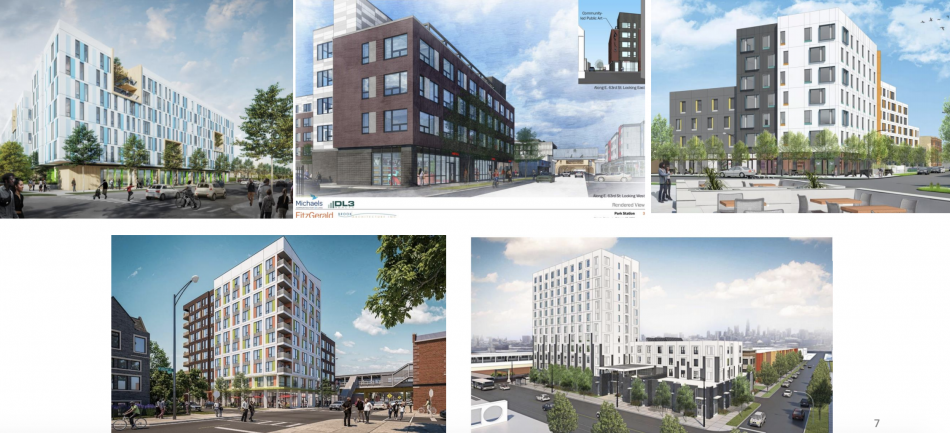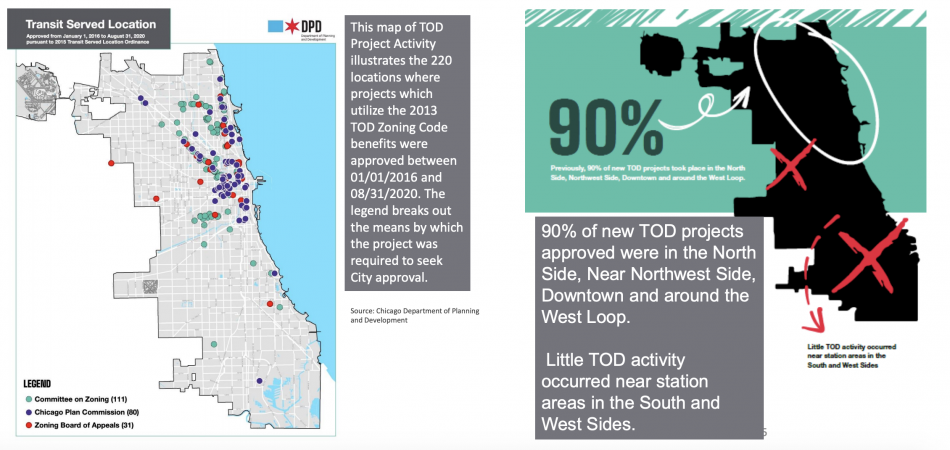A plan to incentivize expanding transit-oriented development to Chicago's underserved communities got a boost this week as the Chicago Plan Commission voted to adopt the Equitable Transit-Oriented Development (eTOD) Policy Plan. Drafted over the past two years, the document aims to "advance racial equity, wealth building, public health, and climate resilience goals" by encouraging affordable, transit-oriented developments in all Chicago neighborhoods.
Chicago's existing Transit-Oriented Development (TOD) Ordinance allows for projects near mass transit to significantly reduce or entirely eliminate parking and build additional height and density. The TOD rules first went into effect in 2013 and were significantly strengthened in 2015. The ordinance was further expanded in early 2019 to include certain high-ridership bus corridors.
However, since Chicago adopted its TOD policies, a staggering 90 percent of transit-oriented projects have been built either downtown or in affluent or gentrifying neighborhoods on the North and Northwest sides, according to the policy plan. Undeveloped TOD-eligible sites near rail stations are 40 percent more likely to be in areas with Black and Brown populations.
While the newly adopted eTOD rules don't necessarily aim to discourage continued transit-oriented development in those neighborhoods, it does seek to address the lack of TOD in other areas and "protect existing residents from displacement, expand housing opportunities, mitigate the effects of housing segregation, and ensure inclusive economic growth," according to city officials.
On Friday, Mayor Lori Lightfoot announced the launch of a $135,000 ETOD pilot program to select between five and ten community-driven proposals to receive financial assistance. Projects will be evaluated in a two-stage public application process by a committee comprising city planners, community groups, developers, and other experts.
If selected, pilot projects can receive micro-grants of between $7,500 and $15,000 to "enhance equity-focused components in their proposals." Projects with a community ownership component can earn larger grants of up to $20,000. The pilot will also provide accepted applicants assistance with overall planning, navigating bureaucratic processes, and securing the necessary financing to move forward. Applications will go live on the city's eTOD website on Tuesday, June 22.
"The ETOD Pilot Program is our city's latest equity-focused and inclusion-driven effort that will aid in the revitalization of neighborhoods and leverage the incredible infrastructure assets they possess—CTA, Metra, and Pace—to make them as vibrant, safe, and sustainable as possible," said Mayor Lightfoot in a statement. "Everyone in Chicago deserves to live in healthy, walkable neighborhoods with access to transportation options that not only connect them to opportunities in every corner of Chicago but enhance their quality of life overall."
Although Chicago's previous TOD policies left behind many communities and income levels, there are a handful of equitable projects currently in the works that the eTOD program hopes to emulate. Notable examples include the 100 percent affordable Emmett Street Apartments in Logan square, the mixed-use 43 Green project next to Bronzeville's 43rd Street Green Line station, and an upcoming 12-story mixed-income TOD near the United Center of the city's Near West Side.
 A rendering of some of the proposals that the eTOD policy plan hopes to emulate elsewhere in the city. Chicago Department of Planning and Development
A rendering of some of the proposals that the eTOD policy plan hopes to emulate elsewhere in the city. Chicago Department of Planning and Development







